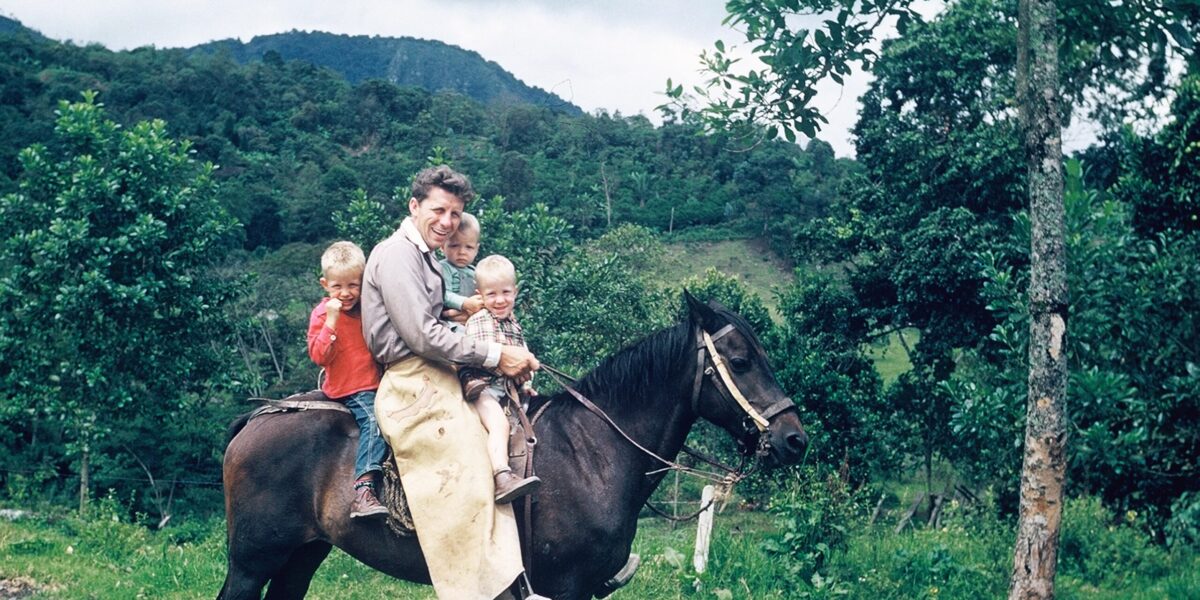Elkhart, Indiana (Mennonite Mission Network) – Laverne Rutschman, son of David and Lizzie (Elise) Zuercher Rutschman, born Mar. 31, 1919, in Newton, Kansas, passed away Mar. 21, 2018. Brought up on a farm three miles southeast of Elbing, he attended Elbing Elementary School and Whitewater High School, graduating in 1936.
On May 31, 1937, two brothers, Orrin and Pete, lost their lives in an automobile accident while traveling to sing for a college commencement service in Tennessee. This loss would later inspire Rutschman to pursue Christian service. He felt that God had called him to do so to honor and continue the work of his brothers.
Rutschman began attending the Bible Institute of Los Angeles (Biola) in 1938, which laid an academic foundation from which he built a life of study, teaching and ministry. Later, he went on to achieve a master in religious education after having also studied at various colleges and seminaries throughout the Midwest.
In 1946, Rutschman married Harriet Fischbach. Together, they worked at Comins Mennonite Church in Michigan for a year before beginning their life work under the Commission on Overseas Mission, a predecessor agency of Mennonite Mission Network.
After several months of language study, they began working in Cachipay, Colombia, with children whose parents suffered from Hansen’s disease. They also planted churches in other communities in Colombia from 1948 to 1955. During these seven years, their family grew and they became parents of David, Robert, Thomas, Ruth and Richard.
Responding to a different invitation to serve, they moved to Uruguay to work with the Seminario Evangélico Menonita Teológico (SEMT/CEMTA, Evangelical Mennonite Theological Seminary) in Montevideo. There, Rutschman taught theology as well as Old Testament, and also served as dean. During this assignment, he also graduated from the Southern California School of Theology in Claremont with a PhD.
An excerpt from the book, 60 Años SEMT/CEMTA Educar para servir (60 years, SEMT/CEMTA Educate to serve), described Dr. Rutschman as generous with his knowledge and not only a professor, but also a friend and counselor. It also noted that "Professor Rutschman integrated into the community, not only in the small community of the seminary, but also in the problems of Latin American society that concerned him deeply, and for which he invested effort in understanding and discerning objectively."
In January of 1969, the family of seven purchased a 1930 Model A Ford in Argentina, which they drove all the way to the United States, arriving in Newton, Kansas, 10 weeks later. The following five years, both Laverne and Harriet taught at Freeman Junior College and Academy in South Dakota.
With the children all gone from home, in the fall of 1974, they returned to South America to work with the Mennonite churches in Santa Cruz, Bolivia. They also taught in the Baptist Seminary in Cochabamba, spending two weeks of each month there and two in Santa Cruz during the academic year.
In an effort to relate Anabaptists with the wider Christian community in Latin America, they later joined the faculty of the Seminario Biblico Latinoamericano (Latin American Biblical Seminary, SBL) in Costa Rica in 1977. Rutschman taught Old Testament and Hebrew and worked as registrar. He also taught many courses under the Seminario Anabautista Latinoamericano (Latin American Anabaptist Seminary, SEMILLA) program in Central America and Panama, and prepared study manuals for both SBL and SEMILLA.
Ovidio Flores, from Honduras, in remembering Rutschman, shared that he still has the study manual Rutschman wrote: Anbautismo Radical y Teología Latinoamericana (Radical Anabaptism and Latin American Theology). Flores wrote: "In the 1980s, there was so much talk about liberation theology, and it produced fear, suspicion, doubts and arguments from the Evangelicals who accused the Mennonites of being promoters of violence. [Because of the book] I could understand very clearly what Anabaptism is and the social implications for peace and nonviolence." Flores also shared that while this book is valuable in any context, it is especially so where there is active violence.
In 1983, they returned to Colombia for two years to work with the Presbyterian seminary where Mennonites also studied, and with local churches. Rutschman wrote in a summary of his service that "to return to Colombia (1983-1984) was almost like going home."
After this, they returned to their work in Costa Rica and retired two years later in 1987.
Rutschman dedicated time in his retirement to the translation of documents, including news releases, bulletins, prayer requests, and correspondence for the General Conference, the Western District and the South Central conferences, as well as other entities. He and Harriet became charter members of the Shalom Mennonite Church in Newton, Kansas.
"We are grateful to God and to our churches for giving us the opportunity to spend our lives in this way," said Rutschman. "The message of salvation and justice must be heard and practiced ‘to the ends of the earth and to the end of time.’" He and Harriet expressed their gratitude for their loyal family. Their five children and their spouses are David (Marj Byler), Robert (Elise Renault), Thomas (Disa Anderson), Ruth (Robert Holliday), and Richard (Margaret Dublin), 18 grandchildren, and nine great grandchildren. They were also thankful for the fellowship of the Shalom Mennonite Church and for many faithful friends and family living in many parts of the world.
Rutschman was preceded in death by his wife, Harriet, as well as his siblings and their spouses: Evelyn (Fred Langenegger), Waldo (Vera Stuart), Orrin (Helen Evelyn Peterson), Henry (Frances Stuart), Pete, and Jeannette (Frank Isaac), and one granddaughter. Survivors include his children and their spouses as well as the grandchildren and great grandchildren and many nieces and nephews.
A memorial service will be held at 11 a.m. on Mar. 31 at the Shalom Mennonite Church in Newton.







